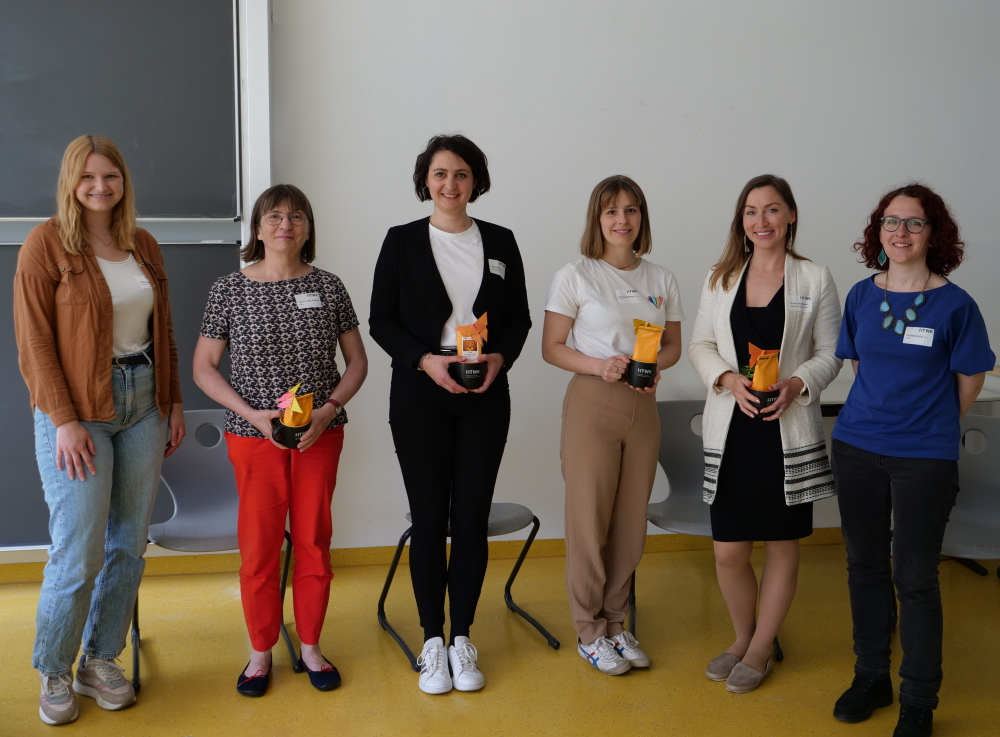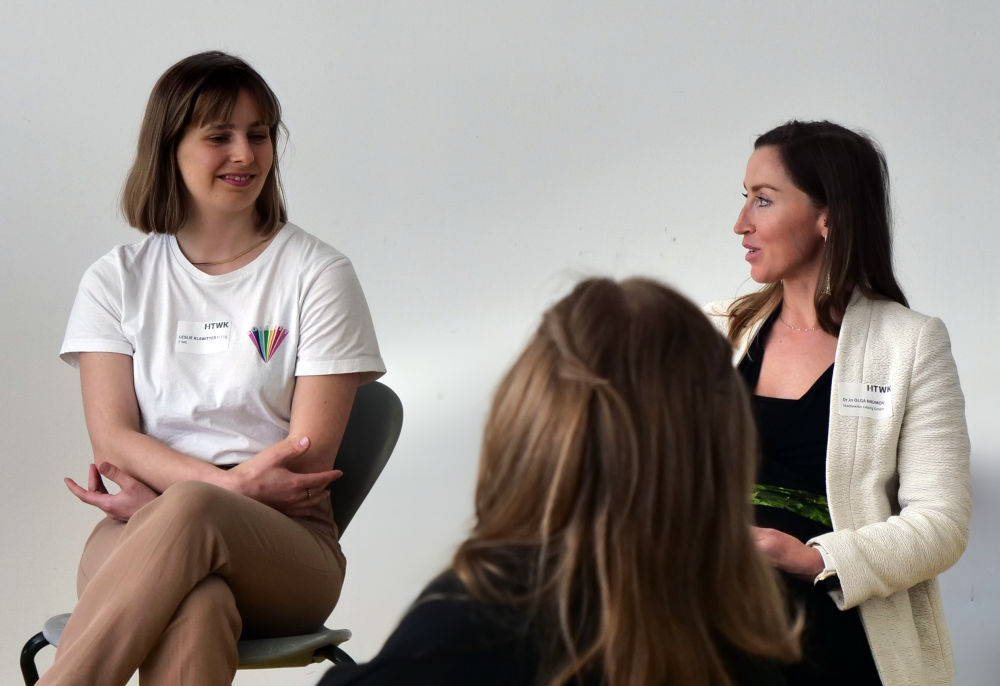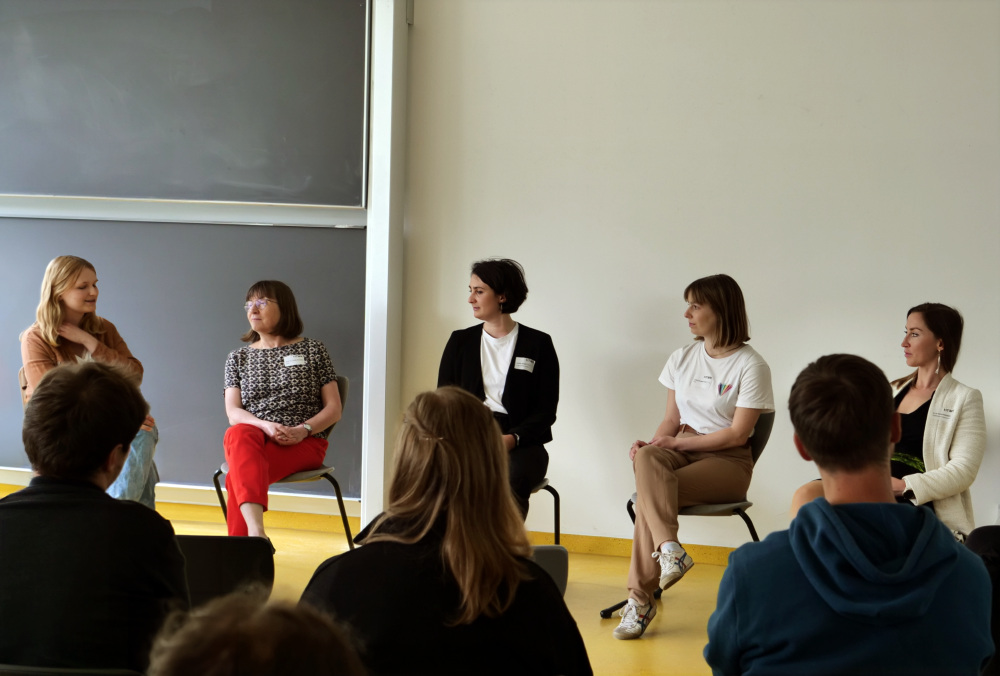At the "Women in Engineering" talk, four talented female engineers shared their experiences and passion for the field with the audience.

On 24 May 2023, four talented female engineers shared their experiences and passion for the faculty with the audience at the "Women in Engineering" talk as part of the Faculty Festival of the Faculty of Engineering. What brought them further along their career paths provided inspiration for more than just female students.
Prof Anke Bucher, M.Sc. Lydia Schott, M.Eng. Leslie Klawitter and Dr Olga Naumov answered questions from Amelie Merbach, Equal Opportunities and Inclusion Officer of the Engineering Student Council, and M.A. Therese Pagel.
When you ask Leslie Klawitter, research assistant in the "GreenInnoSax" junior research project, what motivated her to study energy, building and environmental engineering at HTWK Leipzig, she says: "As a schoolgirl, I already felt the urge to take active action against climate change and thus developed an interest in renewable energy sources. It was a stroke of luck that my physics teacher specifically encouraged me to continue my education." In addition to the interesting degree programme, she was also attracted by the city of Leipzig. For Lydia Schott, a doctoral student in electrical engineering and test engineer at SENEC GmbH Leipzig, her path led her to HTWK Leipzig via the solar technology degree programme in order to complete a Master's degree in electrical engineering and information technology. She only realised that a doctorate could be something for her when she was approached by Prof. Faouzi Derbel. "I always thought that a doctorate was only for the very best. I didn't even realise that I could do it as a good graduate - or how a doctorate actually works." In hindsight, she is glad that she dared to take this step into the unknown and is proud to be an expert in her field as a doctoral student.
Dr Olga Naumov, who is now Senior Manager for Technology and Innovation Projects at Stadtwerke Leipzig and comes from a family of physicists with doctorates, was already familiar with the doctoral process. The fact that she would be researching an energy-related topic in the field of fuel cell and battery research was a happy coincidence. She explains: "I had already acquired in-depth knowledge through my doctorate. My role as a city councillor finally brought me into the focus of Stadtwerke Leipzig for a position with the opportunity to shape future projects."
For Prof Anke Bucher, it was also a lucky coincidence that led her to the professorship. If someone had predicted after her studies that she would one day become a professor of applied mechanics, she probably wouldn't have believed it. A former fellow student drew her attention to a graduate programme at Chemnitz University of Technology with an exciting topic for a doctorate. She successfully applied. "When I started my doctorate, I realised how much fun I had doing research. From that point on, I aspired to a professorship," she recalls. Her work on DFG projects and her deputy professorship in Applied Mechanics at HTWK Leipzig then solidified this career goal. Today, she enjoys the diversity of her profession: imparting in-depth knowledge, conducting research and supporting students in planning their stays abroad - all of which she would not want to do without. The various CVs show that career paths are often shaped by chance, but also through the targeted promotion of personal interests.
Learning from failure
During the conversation, it becomes clear that not everything always goes according to plan and in a straight line. All four confirm that the statement "You learn from failure" is by no means a platitude. Dealing with it is crucial. Prof Bucher emphasises: "It is inevitable that something will go wrong. I see failures as opportunities to grow. It's worth enduring and reflecting on difficult phases and moments: What can I learn from this and how could I deal with it next time?" Prof Bucher also recommends doing some soul-searching and recognising and appreciating your own successes.
External input can also open your eyes. Lydia Schott, for example, has used coaching and encourages others to take advantage of such opportunities. "It helped me to recognise my strengths and gain clarity about my professional future. It was particularly helpful during my doctorate." Dr Olga Naumov agrees and adds: "I like to seek advice from those around me. This can be people from my circle of friends or work environment or even inspiring personalities I've met at conferences."
Recognising yourself
Recognising their own achievements is a key issue that the female engineers are confronted with time and again during their studies and later on. Each of them has had the experience of having to work harder as a woman in order to receive the same recognition. Professor Bucher shares her experience from industry in France where, as a woman and a foreigner, she only received temporary employment contracts, while fresh French university graduates were offered permanent employment straight away. This injustice helped motivate her to break new ground and recognise her own worth.

In this context, communication with superiors and team members plays an important role. Leslie Klawitter emphasises the importance of clearly representing one's own point of view and explains: "A healthy level of self-confidence doesn't hurt. I have learnt that my opinion and my contributions are also important and I now also make myself heard in larger groups. Particularly in well-established teams or in discussions with experienced people, this initially took some effort on my part". Dr Naumov adds that communication in the working world is also very much about relationships and advises people to cultivate their own network.
Time is a precious commodity: whether you are a doctoral student, professor or research assistant, there is always a lot to do. It is not uncommon for one's own ambition to do everything perfectly to eat up time. Dr Naumov reported that she personally always strived for perfect results, while her male colleagues were already satisfied with what felt like 80 per cent. This leads to unnecessary pressure. "It's important to have realistic expectations of yourself and accept that you can't do everything perfectly," she explains. "By focussing on the essential tasks and freeing yourself from unnecessary perfectionism, you can save valuable time and still achieve good results."

Valuable voices and role models
The panel discussion makes it clear that women play a valuable role in the engineering industry and that their voices and perspectives are crucial to finding innovative solutions to the challenges of today's world. The female engineers want to encourage female students in particular to "keep at it" and not give up. The response to the talk shows that their message is being heard. One female student emphasised after the event: "I often lacked female professional role models in my everyday life as a student. In five years of studying, for example, I only had one female professor. That's why I find events like this all the more important, where women in 'male domains' talk about their professional careers."
Event information: FLINTA* get-together
Since the summer semester 2022, the Faculty of Engineering has held a FLINTA* get-together once a semester for all FING students. Students can network over coffee and cake. Every second meeting also takes place with a role model from the engineering sciences. The FLINTA* get-together is organised by Amelie Merbach from the FSR ING. The next date - probably in November - will be announced at the beginning of the winter semester.